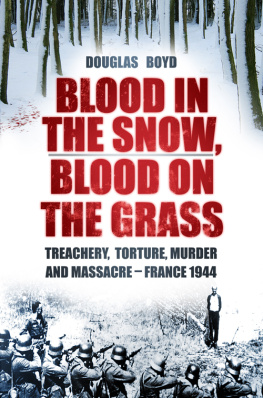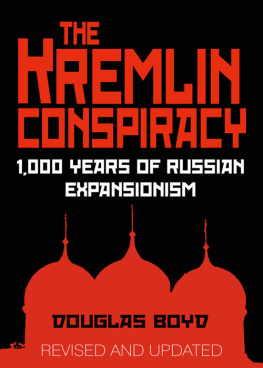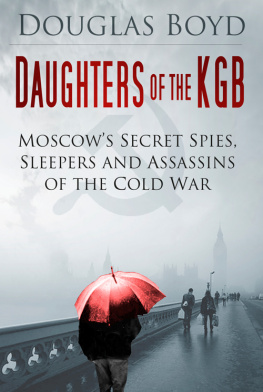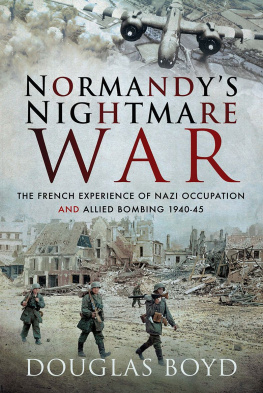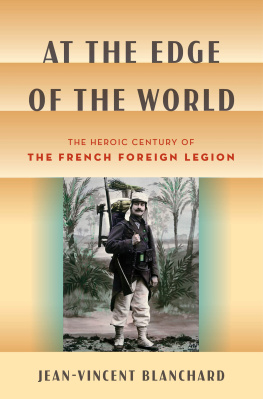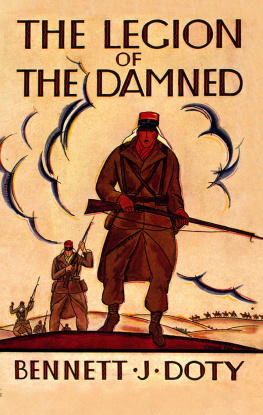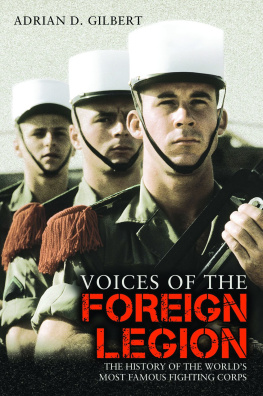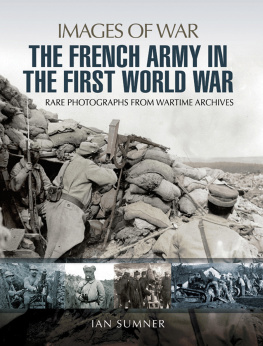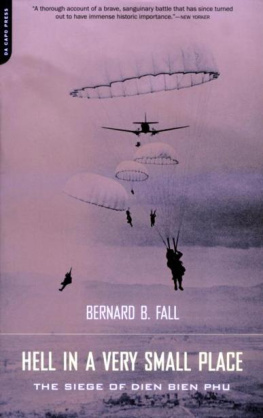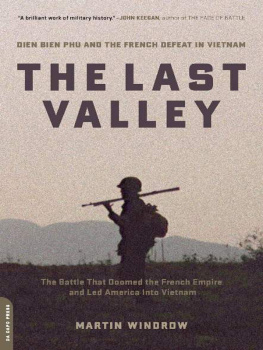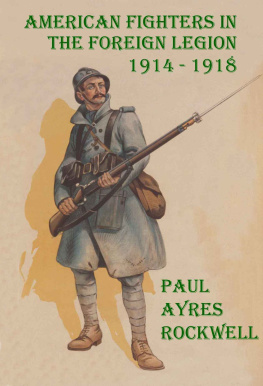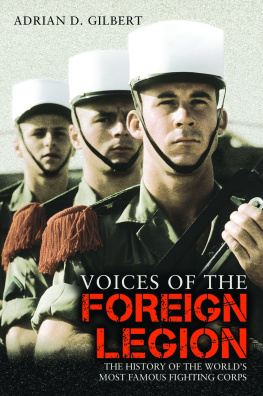The French Foreign Legion
Douglas Boyd
Douglas Boyd 2015
Douglas Boyd has asserted his rights under the Copyright, Design and Patents Act, 1988, to be identified as the author of this work.
First published 2006 by Sutton Publishing, Thrupp
Second edition 2010 by Ian Allan Publishing
This edition published in 2015 by Endeavour Press Ltd.
Sans honneur ? Ah , passons . Et sans foi ? Quest - ce dire ?
Que fallait - il de plus et quaurait - on voulu ?
Navez - vous pas tenu , tenu jusquau martyre ,
la parole donne et le march conclu ?
They say that youre without honour or faith,
But what more could they have asked?
Did you not fulfil unto death
the sworn duty with which you were tasked?
Legion Captain Borelli , to his legionnaires
who died at Thuyen Quang in 1885
Table of Contents
Foreword to the First Edition
By Brigadier Anthony Hunter Choat, OBE
Since King Louis Philippe created the French Foreign Legion in 1831, thousands of books and articles have been written and countless films made about this mysterious, myth shrouded body of men which has been almost continuously in combat in Africa, Asia, Europe and the Americas ever since. Legionnaires I was one myself have always loved a fight, man against man, section against section, company against company. The other characteristic that makes them good soldiers is their craving for the satisfaction of duty done and orders obeyed.
Their Latin motto Legio patria nostra means the Legion is our country and tens of thousands of legionnaires have fought for this adopted country, winning themselves worldwide respect and admiration. Many have died and many more been wounded performing deeds of the most amazing valour, but until now little has been known of the social and geopolitical circumstances in which they were achieved.
Living in France and speaking French like a native, Douglas Boyd has long been fascinated by the Legion and explored the subject in earlier writings. He understands what motivates the French and what motivates the Legion. The two are not always the same. This major work weaves French political warp with the weft of the Foreign Legion to produce a comprehensive, tight and fascinating history. Boyds knowledge of French politics over a span of nearly two centuries, particularly in Indochina and North Africa, gives him a clear perspective on the Legions activities, and throws light on the reasons for its successes and failures, and for its sometimes recalcitrant attitude.
For the greater part of its existence, the Legion has been unashamedly used by French governments for operations overseas that attracted little support or interest at home and for which the average Frenchman had no taste. Legionnaires have accepted this so long as the deal was fair and honest. Although France's treatment of the Legion now is excellent perhaps because Paris has at last realised that it is an asset not to be wasted or disparaged in the past, the deals have sadly often been far from fair and honest. Nonetheless, legionnaires have carried out their mission whatever the cost. Reading the accounts of the battles of Camerone, of Highway Four and Dien Bien Phu will tell the reader just how high that cost has been.
As a former legionnaire, I welcome this book, for both its depth and clarity. It will greatly enhance the Legions already superb reputation.
Tony Hunter Choat ( formerly 116798 Sergeant Choat of REP )
Hereford , September 2005
Introduction
While researching this book, I met at the bar of a West London cricket club a former SAS sergeant and naturally asked him whether he had ever bumped into the Legion during his service years. Not exactly a chatty guy, he eyed me suspiciously before admitting that he had several times.
I asked, When was the last time?
A while back, he replied.
Where?
Luckily, I was with a mutual friend with whom I served in the RAF so the man of few words took another draught of beer and said, Western Sahara.
The disputed territory to the south of Morocco? That sounded promising, so I pushed my luck and asked, What was the Legion doing there?
By now, he had had enough of my questions, and muttered, Same as us, like.
And what was that? I asked innocently.
He finished his beer, said, Dont be f---ing daft, and left.
It can be difficult, researching the Legion. As Brig Hunter-Choat says, its a mysterious, myth shrouded body of men which has been in combat somewhere on the globe more or less continuously for nearly two centuries. So, where does one begin?
Well, the most famous Frenchman of all time was a soldier who was not even born in France, but on Corsica when Italian was its first language. The two best-known French presidents of the twentieth century were both military men. Marshal Philippe Ptain was the Hero of Verdun in World War I who became the Traitor of Vichy in World War II, after which his former protg and wartime enemy General Charles De Gaulle sentenced his senile ex-patron to death, and commuted the sentence before turning France from the sick man of Europe into an independent nuclear super-power.
In a country where politics and the military are so closely interwoven it is no surprise to find that one branch of the armed forces has provided many generals, marshals and high-ranking politicians up to Prime Minister. That it should be the Foreign Legion gives cause for thought.
What makes the French Foreign Legion different from any other army apart from its unequalled mixture of races is that it numbers in its ranks men from all social and educational backgrounds: musicians like American Cole Porter, philosophers like Hungarian-born Arthur Koestler, writers like Switzerlands Blaise Cendrars and the grand old man of German letters Ernst Junger. Poets, painters and professional sportsmen have served alongside bemedalled veterans prepared to work their way up again from the lowest rank after donning Legion uniform.
For 179 years jobless, homeless and loveless men have found a sense of purpose worth all the rigours and risks of serving in the worlds longest-standing mercenary army, but so too have many born in palaces. Royal legionnaires include King Peter I of Serbia, Prince Louis II of Monaco, Crown Prince Sisowath Monireth of Cambodia and princes Aage of Denmark and Amilakvari of Georgia. Of slightly lesser pedigree was Prince Napoleon, son of Princess Clementine of Belgium and great-grandson of the Legions founder King Louis-Philippe. The Prince served as Legionnaire Blanchard, No 94707. His haughtier cousin the Count of Paris enlisted as engag volontaire DOrliac with the number 10681. Maxim Gorkys adopted son rose from enlisted rank to generals stars, yet chose to be buried beneath a stone inscribed simply Legionnaire Zinovi Pechkoff .
Twenty-first century recruits are unlikely to be motivated by the romance of Edith Piafs hit-song about her legionnaire lover, whose skin smelt deliciously of hot desert sand. Fewer still will ever have read the Beau Geste novels or watched 1930s black-and-white films in which legionnaires dying from booze and boredom inside remote Saharan mud-brick forts snap out of it just in time to rescue rich and glamorous lady tourists from the rapacious veiled warriors of the sands.
So what is it that attracts men still unborn when the USA disengaged from the Vietnam conflict to accept the harsh discipline of this legendary army with a Code of Honour that sounds like the Boy Scouts pledge? Every other legionnaire is your brother . In combat , you act without passion or hate but with respect for your vanquished enemy . You never abandon your dead , your wounded or your weapons
Some join in search of adventures you cant find in civilian life. For others, its a fresh start after unemployment, a police record, family or girl-trouble. For many, the reward is French citizenship at the end of their service, with all the freedoms of the European community theirs to enjoy. In the words of one of the Legions many poets, Pascal Bonetti, they become sons of France not by inheriting French blood, but by spilling theirs for France. Whatever his reason for joining, every legionnaire knows that for the rest of his life he will never have to prove himself among fighting men. To have worn the white kepi is proof that he is as tough as they come.
Next page

